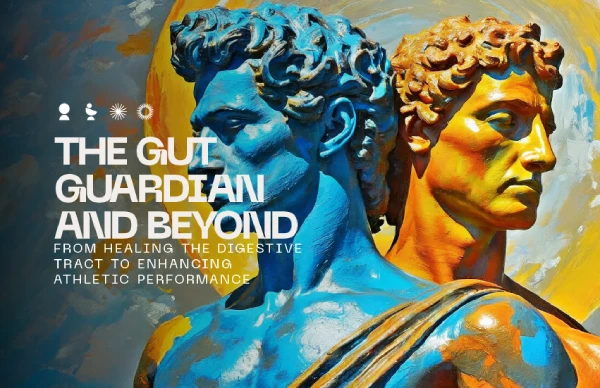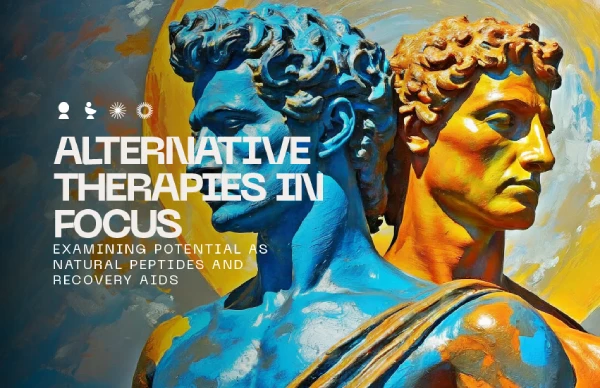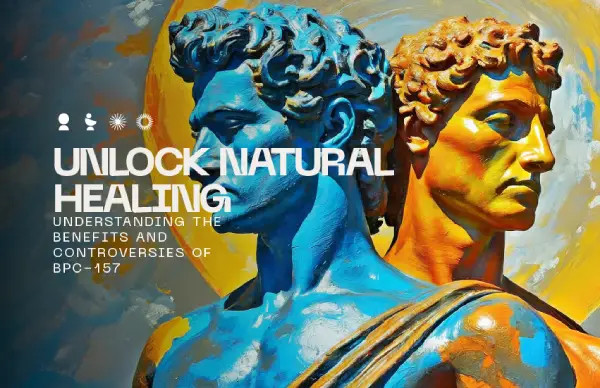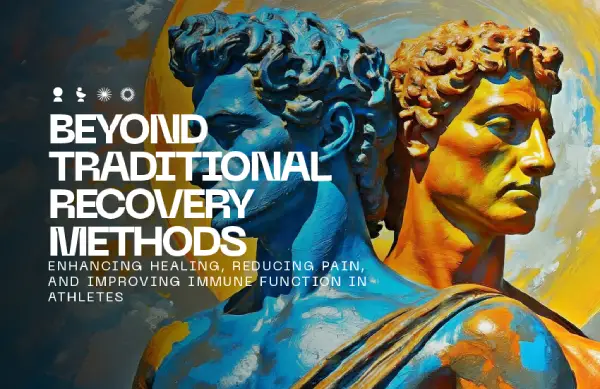Blog
The Controversial World of BPC-157 and Sports: Recovery Aid or Performance Enhancer?

Contents
Understanding BPC-157
The role of BPC-157 in sports
Why is BPC-157 controversial?
BPC-157 and injury recovery
Conflicting claims and psychological impacts
Legal and ethical considerations
Athlete responsibility and informed choices
Enjoy the benefits of BPC-157 from LIVV Natural
BPC-157 is a peptide gaining increasing attention in the world of sports. Many praise it for improving recovery and healing, cognition, and performance. It may also boost gut health, increase blood flow, and reduce pain.
Professional athletes face conflicting views and controversies over the use of BPC-157. It’s a relatively new compound that has more anecdotal than scientific evidence. Could it find its place in competitive sports, and is it useful for recreational exercise?
Join us as we explore the fascinating BPC-157 peptide, its functions, and controversies. Discover its benefits, then find out where to get it after making an informed decision.
Understanding BPC-157
Body Protection Compound 157, or BPC-157, is a synthetic substance. It’s derived from the naturally occurring peptide in the body’s gastric juice. This pentadecapeptide makes up a fraction of the entire BPC protein, with 15 amino acids. It’s vital for enzyme-binding spots.
A Croatian science team discovered BPC early in the 1990s and studied its potential. Scientists then isolated it and created a synthetic version to explore its benefits.
They noted that the natural peptide has protective functions in the gut. It helps promote and speed up the repair and regeneration of the lower and upper GI tract. They found it helps prevent ulcers, support blood vessels, and stabilize the microbiome.
The synthetic BPC-157 peptide has risen in popularity since its discovery. Regenerative and nootropic industries have touted its benefits. Athletic, bodybuilding, anti-aging, and biohacking communities have also used it for various purposes.
BPC-157 binds to specific receptors in the body and activates them. It works by boosting the levels of tight junction proteins and protecting the gut. The peptide also prevents bacteria and toxins from entering and damaging the gut.
The BPC-157 peptide aids in producing angiogenic growth factors like FGF, TGF-b, and VEGF. These proteins play roles in healing wounds, promoting cell development, and combating inflammation.
Below are five other mechanisms of action that BPC-157 might perform.
- Promotes angiogenesis and forms new blood vessels
- Inhibits inflammatory cytokines, decreasing inflammation
- Stimulates tissue repair and immune system functioning
- Interacts with the nitric oxide pathway, promoting various benefits
- Controls the Gut-Brain Axis (GBA), responsible for regulating vital bodily processes
BPC-157 could have different mechanisms of action that overlap in some individuals. A single dose might offer unique benefits for each person.
The role of BPC-157 in sports
Where does BPC-157 fit in the world of sports?
Athletes are prone to experiencing pain, wounds, and injuries throughout their careers. Many over-the-counter or prescription medications, recovery aids, and drugs are available. Not all of them do what they claim to, and many have concerning side effects.
Proper recovery is vital for maintaining a happy and healthy exercise routine. You need enough sleep, the right foods, regular training, and sufficient rest periods. These natural elements help you achieve your goals, but sometimes you might want a boost.
Using substances and performance-enhancing drugs (PEDs) in sports is controversial. Some examples are steroids, erythropoietin (EPO), and human growth hormone (hGH). They may boost strength, endurance, and recovery, but come with devastating risks.
Many athletes have lost their claim to fame because of their use of specific substances. Others turn to non-steroidal anti-inflammatory drugs (NSAIDs) like ibuprofen, diclofenac, and aspirin. They aren’t illegal or banned, but they could cause problems like a damaged liver or gut lining.
Here’s where peptides like BPC-157 come in. They typically cause no side effects, as they occur in our bodies naturally. Many people have reported wide-ranging physical and mental benefits in various areas.
The most notable role BPC-157 could play in sports is healing and recovery. Below are nine potential benefits.
- Increases blood flow
- Improves gut health, digestion, and gastrointestinal functioning
- Enhances cognition and brain health, leading to improved training
- Reduces pain and inflammation
- Faster healing and regeneration of wounds, tendons, muscles, joints, and ligaments
- Boosts immune system function and improves protection against illness, viruses, and allergens
- Improves functions of the central nervous system
- Promotes healthy tissue growth and repairs damage
- Helps stabilize the production of neurotransmitters and hormones
BPC-157 has become increasingly popular in the fitness, sports, and athletics community. It may prove beneficial in acute or chronic wound and pain management. Some use it for treating damaged skin, cuts, and burns.
This wondrous peptide also stimulates specific growth hormone receptors and gene expressions. This function boosts the production of repair enzymes, leading to faster healing.
Athletes suffering from muscle strains, tendonitis, and chronic conditions could benefit from BPC-157. It may provide anti-inflammatory and antioxidant effects. Sports people might gain help from it during training.
BPC-157 isn’t a PED, but its recovery benefits could help improve sports performance. Some users claim it boosts their moods and motivation. It may help athletes focus better and feel more inspired during training. Some report it also helps combat depression and anxiety.
BPC-157 and injury recovery
BPC-157 might be effective for helping athletes recover from injuries. The peptide, in its natural form, promotes angiogenesis, which forms new blood vessels. It increases type 1 collagen and improves blood flow. These processes aid in regeneration and wound healing.
There aren’t extensive study results for the effects of BPC-157 on humans. Some research reviews and interviews point to many positive anecdotal and scientific reports.
Many advocates tout its potential for medical conditions and internal and external injuries. It interacts with the nitric oxide pathway, providing benefits like improved oxygen transport.
Rat studies have also shown positive results. Below are some injuries and conditions that BPC-157 might treat effectively.
- Inflammatory bowel syndrome
- Stomach ulcers
- Bone fractures
- Injured ligaments, nerves, and muscles
- Tendinopathies (tendon injuries) like tennis or golf elbow, trigger fingers, or Achilles tendinitis
- Ulcerative colitis (short bowel syndrome, anastomosis, and fistula)
- Perforated cecum (part of the large intestine)
- Post-surgery recovery
- Spinal cord injuries
- Arrhythmia (irregular heartbeat)
- Periodontitis (gum damage)
The outcomes for rats may differ from those for humans. Several personal anecdotes praise its benefits in various areas.
Stephanie Wolff is a Physician Assistant and Hormone and Peptide Expert from the Novus Anti-Aging Center in California. She has personally experienced BPC-157’s healing benefits twice.
It helped her recover from a fractured wrist after doing pull-ups. The second incident was an injured ankle three years later. She had what her doctor called a miracle recovery both times, thanks to BPC-157.
An extensive paper highlighted BPC-157’s potential to accelerate musculoskeletal soft tissue healing. It also delved into the peptide’s efficacy for ligament and tendon recovery. Long-term therapeutic benefits were also evident.
Dr. Marcos De Andrade runs a wellness facility called Biohax in Miami, Florida. He praises BPC-157, claiming it helps him recover from his Jiujutsu injuries. His reports also point to it aiding in musculoskeletal and gastrointestinal repair.
One review of our LIVV BPC-157 peptide injection comes from athlete Raj Q. He says, “As an athlete, BPC-157 has become my secret weapon for recovery. It speeds up the healing process, allowing me to perform at my best.”
A preclinical safety evaluation of BPC-157 revealed its protective and healing properties. It showed positive results in wounds and organ damage, even at low doses. Athletes could benefit from it as part of their dietary and supplementary regime.
Conflicting claims and psychological impacts
Medical, recreational, and mainstream medications of any kind typically face conflicting views. There may be differing opinions or unique experiences. BPC-157 is a relatively new compound that still needs extensive research.
View claims with an objective perspective. Negative reviews or opinions, as with many medications or supplements, may be prejudiced. Some people might be wary of peptides as they aren’t as well-known as other substances.
Most available research and data come from rodent studies. Rats have many physiological and anatomical similarities to humans. Many positive tests have shown the same results for us.
Anecdotal evidence isn’t the same as scientific proof, but they often align. Many human reports of BPC-157 have matched research outcomes.
Below are some potential psychological impacts of BPC-157 on performance.
- Improves cognitive function, protects brain cells, and enhances memory.
- Promotes healthy motor function.
- Regulates the brain’s neurotransmitter levels, combating symptoms of anxiety and depression.
The potential physical effects of BPC-157 may boost other areas of psychological health.
Why is BPC-157 controversial?
BPC-157 isn’t an FDA-approved substance. The Food and Drug Administration has an extensive banned and unapproved list. This synthetic peptide falls under Category 2 of bulk substances in compounding.
This categorization doesn’t mean BPC-157 is fully illegal. It holds a 503A classification as of September 29, 2023. The FDA can take action if a facility or supplier mixes the peptide with other substances. This practice is “compounding.”
The World Anti-Doping Agency (WADA) prohibits many substances in sports. BPC-157 falls under the category “S0 Unapproved Substances.” Athletes may face consequences for using it in sports.
Buying BPC-157 is possible for research purposes. You may also get it from a licensed physician as an alternative therapy if other treatments don’t work.
Peptides are growing in popularity worldwide. Rules and regulations may change as more research results emerge. Many scientists are confident in BPC-157’s benefits, but the FDA and WADA need to approve it for human use.
Some professional sports league bodies don’t condone the use of several peptides. Anti-doping regulations consider them a form of doping that provides an unfair advantage.
BPC-157 is controversial, as it’s a natural peptide but still relatively unknown. Many argue that it shouldn’t fall under doping classifications. Local commissioning boards may have different rules and allow it. It’s important to check your laws and consult your doctor.
Athlete responsibility and informed choices
Making informed decisions is crucial as an athlete, particularly if you compete. BPC-157 has many benefits and may boost various areas of your performance and health. It’s still an experimental synthetic peptide with limited human study results.
Speak to a medical professional about using BPC-157. They should guide you on whether it’s necessary and will benefit you.
Finding a reputable source that doesn’t compound the peptide is essential. We at LIVV follow strict manufacturing standards and ensure ingredient purity. All our products go through third-party testing and medical doctors have approved them.
BPC-157 isn’t a steroid or performance-enhancing drug. It’s an alternative to many OTC or prescription medications without the side effects. It may benefit you in several health areas and boost physical and mental well-being.
Consider the laws and ethical choices of using BPC-157 in a professional environment. Decide whether you feel comfortable with it and why you want to use it. The recovery aid is promising, but it may be morally conflicting as a performance booster.
Enjoy the benefits of BPC-157 from LIVV Natural
BPC-157 is the synthetic version of a natural pentadecapeptide with 15 amino acids. It binds to and activates specific receptors in the body, causing various results. It could protect the gut, form new blood vessels, heal wounds, and promote faster recovery.
This peptide is controversial in the world of sports. Most scientific results come from the study of its effects in rodents. These outcomes could transition to us successfully, but most human evidence is anecdotal.
The World Anti-Doping Agency (WADA) doesn’t allow using BPC-157 in professional sports. The Food and Drug Administration also hasn’t approved it. These rules may cause ethical and moral conflicts. It depends on whether the athlete plays sports recreationally or professionally.
The sports community is debating BPC-157 and other peptides constantly. Opinions and laws may change as more scientific human studies show positive results. Abiding by the rules is best for now if you play in professional sports.
Get BPC-157 from LIVV Natural after consulting your doctor. You could start experiencing positive results in a few weeks. Forget pharmaceutical drugs with adverse effects; enjoy natural peptides today.
Author: Dr. Jason Phan NMD – Founder of LIVV Natural – Anti-aging – regenerative medicine – peptide therapy




